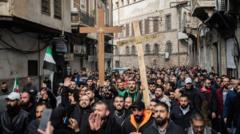Protests in Syria have erupted following the burning of a Christmas tree in Suqaylabiyah, a Christian-majority town amid wider concerns over the treatment of religious minorities under new Islamist rule. Disturbing footage shared on social media captured the arson, which occurred the night before Christmas Eve, with masked individuals seen dousing the tree in an unknown liquid.
The event sparked significant backlash, prompting many Syrians to voice their grievances against foreign fighters allegedly involved in the incident. Marches took place in the capital, Damascus, as protesters chanted slogans demanding "Syria is free, non-Syrians should leave," reflecting widespread frustrations over the influence foreign groups have in the country.
In response to the arson, representatives from Hayat Tahrir al-Sham (HTS), the principal Islamist faction that emerged after the downfall of President Bashar al-Assad's regime, have reassured citizens of their commitment to protecting minority rights. Despite its roots in jihadist ideologies, HTS leaders have recently adopted a more pragmatic approach, promising to create an inclusive governance framework.
Demonstrators also gathered in the Bab Touma neighborhood of Damascus, carrying crosses and chanting that they would "sacrifice our souls for our cross." This heightened fervor illustrates the deep-seated fear among Christians that their religious freedoms may be at risk under the current leadership.
As political dynamics evolve in Syria, new authorities are under pressure to maintain order and security for all ethnic and religious groups. The UN has emphasized the need for guarantees that minority rights will be respected amid these transformational shifts in power.
While many displaced Syrians start returning home—over 25,000 according to recent Turkish reports—the future of the HTS’s governance remains uncertain. As they strive to revise their image, a merger of rebel factions under HTS’s Ministry of Defense has been announced, raising questions about its effectiveness and the inclusion of potential rival groups.
Despite being designated a terrorist organization by several international bodies, HTS appears to be navigating a path toward legitimacy, although skepticism remains prevalent regarding their historical commitments. As the region braces for what may come next, the challenge of integrating diverse groups while fostering a stable political landscape looms large.



















